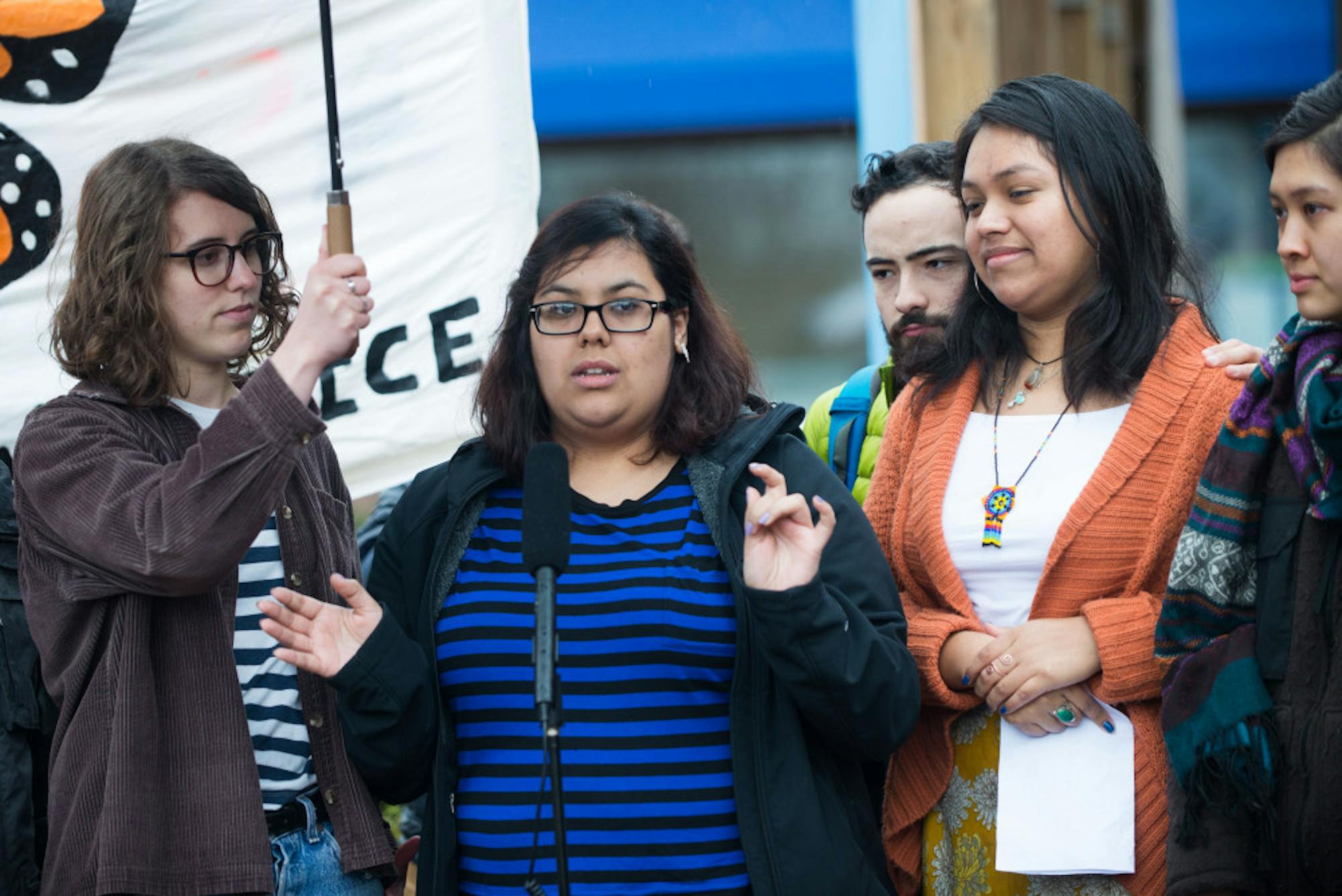At a rally for Tufts United for Immigrant Justice (UIJ) on April 7, Dean of Undergraduate Admissions Lee Coffin announced an undergraduate admissions policy change to welcome applications from undocumented students, a result of the group's continuous effort throughout the past year.
UIJ PresidentZobella Vinik called this change an “important step toward education equity." She and other UIJ members have worked to promote this change through a variety of efforts that aimed to engage the student body and raise awareness for faculty and administrators.
One of the biggest breakthroughs occurred on Nov. 16, 2014, when the TCU Senate, in response to an appeal from UIJ,unanimously passed a UIJ resolution urging Tufts to change its admissions and financial aid policies to become more friendly toward undocumented students. The resolution also pushed for transparency in the admissions system for undocumented students.
To engage the student body, on Nov. 18, 2014, the group wrote an open letter calling on students to sign a petition demanding transparent changes in admissions and financial aid policies and requesting administrative support for this platform.
Vinik noted that the passed resolution and open letter were affirmations of student support for these issues.
As a result, on Nov. 20, 2014, the Undergraduate Admissions and Financial Aid Committee met to review the letter and open up discussion about the issues advocated for by UIJ, according to Committee Chair David Garman.
“We discussed what the existing Tufts policy was, asked questions about why the Tufts policy was what it was and then decided that we needed to collect more information and then talk to some other parties,” he said.
Garman noted that he then met personally with UIJ representatives to gain a better understanding of their goals for Tufts and to help them understand the process of how policy changes can move forward through the administration.
This set off a series of discussions between “key players” Coffin and Mary Jeka, senior vice president for university relations and general counsel, according to Garman.
Jeka attributed the logic behind the existing policy to the confusion with the legal status of these students, as legal requirements have made it difficult for schools to admit undocumented students in the past.
“At many schools there was a concern that these students were treated as international students because many of them came originally from a number of foreign countries, or their parents did, and they were treated as international students," she said. "There were reporting requirements to both the Department of Homeland Security and the Internal Revenue Service, which you could not do with the undocumented students, and so traditionally, we did not accept such students.”
However, when President Barack Obama changed the policies to allow Deferred Action for Childhood Arrivals (DACA) students to be given temporary legal status in the United States in order to get an education, those students were then treated as domestic students, meaning that the Department of Homeland Security requirements did not apply to them, she said.
“We were very supportive of the Obama administration giving us clarification on this issue,” she said. “I think it helped a lot of universities across the country move in the direction of accepting [undocumented students]. Before that, it was a very murky area, and there wasn't a lot of guidance on it.”
According to Jeka, issues accepting undocumented students involved difficult situations with social security numbers. She noted, however, that a lot of these problems "have fairly recently fallen away.”
She explained that the issue was now more straightforward, as previous concerns about reporting requirements are no longer a problem.
“The onus is no longer on the schools," she said. "There is no legal prohibition to accepting [undocumented] students -- it's more an onus on the students themselves to kind of work through some of the issues. As far as the university is concerned, there is no longer a concern with accepting them from a legal perspective.”
She also mentioned that Tufts has previously admitted undocumented students unknowingly, and that upon discovering these students' undocumented status, Coffin felt it was appropriate to let them continue their educations.
Accordingly, one of the strategic goals for 2014-2015 put forth by Dean of the School of Arts and Sciences James Glaser is to “explore new admissions policies regarding undocumented immigrants made possible by the government’s establishment of DACA status,” Glaser told the Daily in an email.
Glaser explained that one of the top priorities of the Arts and Sciences administration is to maintain accessibility to education at Tufts.
“We would like our admissions process to be as open as possible, and there are certainly some very admirable, talented immigrant students who we would like to welcome into our community,” he said. “Our concerns in the past have been legal, and it’s apparent now that we have the freedom to change our policies.”
Garman said that he invited Jeka and three UIJ representatives to attend a committee meeting on Feb. 12 to ensure collaboration while moving forward with a possible policy change.
Garman explained that ultimately, University President Anthony Monaco and members of the undergraduate admissions committee supported the change as consistent with the mission of Tufts, and decided that Coffin would announce this official change at the UIJ rally last week.
Jeka mentioned that this support was given with the understanding that the financial aid requirements for these students would be “especially high.”
“A lot of these students cannot work -- no federal money can go to these students,” she said. “No work-study, no federal financial aid, a lot of the traditional areas of financial aid are not available to these students.”
Despite these difficulties, Tufts is maintaining its commitment to fulfill 100 percent of demonstrated financial need for undergraduate students, Garman said.
Jeka explained that the university needs more time to explore policies for graduate students because of the specificity associated with certification requirements for graduate students, noting that undocumented status may inhibit a graduate student’s ability to receive certification.
“You wouldn't want a student to incur that kind of debt and at the end of the day, not be able to become a doctor,” she said.
Garman emphasized the necessity of transparency in admissions policy moving forward, noting a historical tendency to not make public statements regarding the issue.
"We were already admitting DACA students, but we weren't advertising that we were admitting DACA students,” Garman said. “That would create a lot of confusion with DACA-eligible students who would consider applying to Tufts, because there's no easy way for them to know what their standing would be if they applied. It was all kind of quiet.”
According to Garman, most schools have been accepting DACA students but have not made any sort of public statements in admissions materials or on university websites about this development.
“While it's nice to be accepting those students, not being up front about it creates a lot of confusion,” he said. “How much do you want to spend in application fees to take a chance that the schools that you're applying to are going to be open to your situation?"
Garman said that, for the committee, going public with their new policies better reflected Tufts' goals regarding inclusivity.
"To me, if our mission is that we want to include students from around the world from all types of circumstances -- accepting applications from those students, letting them know that we welcome their application -- I think being public about it is the right thing to do,” he said.
Garman noted that the process of changing the policy has been the quickest that any "big policy decision" has moved through the administration in his time on the undergraduate admissions committee. He attributed this speed to the cooperative manner of the parties involved and to Jeka’s persistence in pushing the initiative forward.
Jeka also credited the success of the policy change to the helpfulness of UIJ members in the process, citing their extensive knowledge about the issues as vital in moving the process along.
Coffin said that while some off-campus media sources have portrayed the decision negatively, he's mostly heard good feedback on campus.
"The reaction has been mixed; I think on campus, it's been positive," he said. "Some media outlets covered it and some of the coverage there was a little negative. But, on campus, I've heard all positive feedback. I've had other deans on campus, a couple of trustees, have reached out and said, 'This is a really important policy, and we're really excited that it's been put in place.'"
While Vinik is enjoying seeing UIJ's work come to fruition, she noted that the group's fight is nowhere near over.
“Us in UIJ are not done fighting for immigrant justice on this campus,” she said. “We continue to support and take action with our brothers and sisters in the Tufts Labor Coalition and the work they're doing to recognize, respect and prevent cuts of our beloved janitorial staff.”
Tufts welcomes policy change to admit undocumented students

Students participate in UIJ's National Institutions Coming Out Day in Support of Undocumented Education Equity on the Lower Campus Center Patio on April 7.





